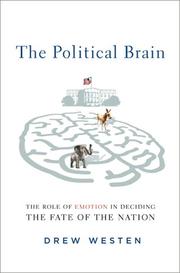| Listing 1 - 9 of 9 |
Sort by
|
Book
ISBN: 1282964593 9786612964596 1400837286 9781400837281 9780691137254 0691137250 9781282964594 6612964596 9780691162249 Year: 2008 Publisher: Princeton : Princeton University Press,
Abstract | Keywords | Export | Availability | Bookmark
 Loading...
Loading...Choose an application
- Reference Manager
- EndNote
- RefWorks (Direct export to RefWorks)
Must we put passions aside when we deliberate about justice? Can we do so? The dominant views of deliberation rightly emphasize the importance of impartiality as a cornerstone of fair decision making, but they wrongly assume that impartiality means being disengaged and passionless. In Civil Passions, Sharon Krause argues that moral and political deliberation must incorporate passions, even as she insists on the value of impartiality. Drawing on resources ranging from Hume's theory of moral sentiment to recent findings in neuroscience, Civil Passions breaks new ground by providing a systematic account of how passions can generate an impartial standpoint that yields binding and compelling conclusions in politics. Krause shows that the path to genuinely impartial justice in the public sphere--and ultimately to social change and political reform--runs through moral sentiment properly construed. This new account of affective but impartial judgment calls for a politics of liberal rights and democratic contestation, and it requires us to reconceive the meaning of public reason, the nature of sound deliberation, and the authority of law. By illuminating how impartiality feels, Civil Passions offers not only a truer account of how we deliberate about justice, but one that promises to engage citizens more effectively in acting for justice.
Political psychology. --- Justice. --- Fairness. --- Impartiality --- Conduct of life --- Justice --- Injustice --- Law --- Common good --- Fairness --- Mass political behavior --- Political behavior --- Political science --- Politics, Practical --- Psychology, Political --- Psychology --- Social psychology --- Psychological aspects --- Political psychology
Book
ISBN: 1282073540 9786612073540 3110217333 9783110217339 3110202379 9783110202373 3110202379 9783110202373 9781282073548 6612073543 Year: 2008 Publisher: Berlin : Walter de Gruyter,
Abstract | Keywords | Export | Availability | Bookmark
 Loading...
Loading...Choose an application
- Reference Manager
- EndNote
- RefWorks (Direct export to RefWorks)
Nietzsche's legacy for political thought is a highly contested area of research today. With papers representing a broad range of positions, this collection takes stock of the central controversies (Nietzsche as political / anti-political thinker? Nietzsche and / contra democracy? Arendt and / contra Nietzsche?), as well as new research on key concepts (power, the agon, aristocracy, friendship i.a.), on historical, contemporary and futural aspects of Nietzsche's political thought. International contributors include well-known names (Conway, Ansell-Pearson, Hatab, Taureck, Patton, Connolly,Villa
Political psychology. --- Mass political behavior --- Political behavior --- Political science --- Politics, Practical --- Psychology, Political --- Psychology --- Social psychology --- Psychological aspects --- Nietzsche, Friedrich Wilhelm, --- Nietzsche, Friedrich --- Nietzsche, Friederich --- Political and social views.

ISBN: 9780511509636 9780521886208 9780521177870 9780511378652 0511378653 0511509634 0521886201 9786611243197 6611243194 1107186706 9781107186705 1281243191 9781281243195 0511377762 9780511377761 0511376855 9780511376856 0511375913 9780511375910 0511374410 9780511374418 0521177871 Year: 2008 Publisher: Cambridge ; New York : Cambridge University Press,
Abstract | Keywords | Export | Availability | Bookmark
 Loading...
Loading...Choose an application
- Reference Manager
- EndNote
- RefWorks (Direct export to RefWorks)
What makes individuals with divergent and often conflicting interests join together and act in unison? By drawing on the fear of external threats, this book develops a theory of 'negative association' that examines the dynamics captured by the maxim 'The enemy of my enemy is my friend'. It then traces its role from Greek and Roman political thought, through Machiavelli and the reason of state thinkers, and Hobbes and his emulators and critics, to the realists of the twentieth century. By focusing on the role of fear and enmity in the formation of individual and group identity, this book reveals an important tradition in the history of political thought and offers insights into texts that are considered familiar. This book demonstrates that the fear of external threats is an essential element of the formation and preservation of political groups and that its absence renders political association unsustainable.
Political science --- Political sociology. --- Political psychology. --- Group identity --- Fear --- Fright --- Emotions --- Anxiety --- Horror --- Collective identity --- Community identity --- Cultural identity --- Social identity --- Identity (Psychology) --- Social psychology --- Collective memory --- Mass political behavior --- Political behavior --- Politics, Practical --- Psychology, Political --- Psychology --- Sociology --- Political philosophy --- Philosophy. --- Political aspects. --- Psychological aspects --- Sociological aspects --- Social Sciences --- Political Science

ISBN: 9781586485139 158648513X Year: 2008 Publisher: New York (N.Y.) PublicAffairs
Abstract | Keywords | Export | Availability | Bookmark
 Loading...
Loading...Choose an application
- Reference Manager
- EndNote
- RefWorks (Direct export to RefWorks)
Political psychology. --- Democracy. --- Identity (Psychology) --- Group identity --- 329 --- Collective identity --- Community identity --- Cultural identity --- Social identity --- Social psychology --- Collective memory --- Politics of identity --- Political participation --- Self-government --- Political science --- Equality --- Representative government and representation --- Republics --- Mass political behavior --- Political behavior --- Politics, Practical --- Psychology, Political --- Psychology --- Political aspects. --- Politieke partijen. Partijwezen. Partijrecht --- Political aspects --- Psychological aspects --- Identity politics. --- 329 Politieke partijen. Partijwezen. Partijrecht --- Democracy --- Identity politics --- Political psychology
Book
ISBN: 9780774814102 9780774814096 0774814098 0774814101 Year: 2008 Publisher: Vancouver: University of British Columbia press,
Abstract | Keywords | Export | Availability | Bookmark
 Loading...
Loading...Choose an application
- Reference Manager
- EndNote
- RefWorks (Direct export to RefWorks)
Political philosophy. Social philosophy --- Affective and dynamic functions --- Political science --- Emotions --- Emotions (Philosophy) --- Political psychology. --- Science politique --- Emotions (Philosophie) --- Psychologie politique --- Philosophy. --- Political aspects. --- Philosophie --- Aspect politique --- Political psychology --- Philosophy --- Political aspects --- Émotions (Philosophie) --- Émotions --- Idées politiques. --- Psychologie politique. --- Émotions (Philosophie) --- Émotions --- Aspect politique. --- Idees politiques. --- Mass political behavior --- Political behavior --- Politics, Practical --- Psychology, Political --- Psychology --- Social psychology --- Feelings --- Human emotions --- Passions --- Affect (Psychology) --- Affective neuroscience --- Apathy --- Pathognomy --- Political philosophy --- Psychological aspects --- Emotions (Philosophy). --- Émotions (Philosophie). --- Émotions (Philosophie). --- Idees politiques --- Political science - Philosophy --- Emotions - Political aspects
Book
ISBN: 9780955248887 0955248884 9781907301292 1907301291 Year: 2008 Publisher: European Consortium for Politcal
Abstract | Keywords | Export | Availability | Bookmark
 Loading...
Loading...Choose an application
- Reference Manager
- EndNote
- RefWorks (Direct export to RefWorks)
Elections --- Political parties --- Political psychology --- Comparative government --- Partis politiques --- Psychologie politique --- Institutions politiques comparées --- Comparative government. --- Elections. --- Political parties. --- Political psychology. --- #SBIB:324H42 --- #SBIB:324H43 --- Mass political behavior --- Political behavior --- Political science --- Politics, Practical --- Psychology, Political --- Psychology --- Social psychology --- Parties, Political --- Party systems, Political --- Political party systems --- Divided government --- Intra-party disagreements (Political parties) --- Political conventions --- Electoral politics --- Franchise --- Polls --- Plebiscite --- Political campaigns --- Representative government and representation --- Comparative political systems --- Comparative politics --- Government, Comparative --- Political systems, Comparative --- Politieke structuren: verkiezingen --- Politieke structuren: politieke partijen --- Psychological aspects
Book
ISBN: 9780521731522 9780521515849 0521731526 052151584X 9780511804366 1316040100 0511804369 Year: 2008 Publisher: Cambridge Cambridge University Press
Abstract | Keywords | Export | Availability | Bookmark
 Loading...
Loading...Choose an application
- Reference Manager
- EndNote
- RefWorks (Direct export to RefWorks)
How can we get inside popular collective struggles and explain how they work? Contentious Performances presents a distinctive approach to analyzing such struggles, drawing especially on incomparably rich evidence from Great Britain between 1758 and 1834. The book accomplishes three main things. First, it presents a logic and method for describing contentious events, occasions on which people publicly make consequential claims on each other. Second, it shows how that logic yields superior explanations of the dynamics in such events, both individually and in the aggregate. Third, it illustrates its methods and arguments by means of detailed analyses of contentious events in Great Britain from 1758 to 1834.
History of the United Kingdom and Ireland --- Political sociology --- Social psychology --- anno 1800-1899 --- anno 1700-1799 --- Collective behavior. --- Political psychology. --- Political sociology. --- Demonstrations. --- Protest movements. --- Political violence. --- #SBIB:324H73 --- #SBIB:324H74 --- #SBIB:93H3 --- Violence --- Political crimes and offenses --- Terrorism --- Social movements --- Marches (Demonstrations) --- Political demonstrations --- Political marches --- Political rallies --- Public demonstrations --- Rallies (Demonstrations) --- Collective behavior --- Crowds --- Public meetings --- Riots --- Mass political behavior --- Political behavior --- Political science --- Sociology --- Politics, Practical --- Psychology, Political --- Psychology --- Behavior, Collective --- Crowd behavior --- Mass behavior --- Human behavior --- Social action --- Politieke verandering: oppositie en minderheid, protest, politiek geweld --- Politieke verandering: sociale bewegingen --- Thematische geschiedenis --- Sociological aspects --- Psychological aspects --- Great Britain --- History --- Demonstrations --- Political psychology --- Political violence --- Protest movements --- Comportement collectif. --- Psychologie politique. --- Sociologie politique --- Manifestations --- Mouvements contestataires --- Violence politique. --- Grande-Bretagne --- Histoire --- Social Sciences --- Political Science

ISBN: 9781586484255 1586484257 9781586485733 Year: 2008 Publisher: New York, N.Y. PublicAffairs
Abstract | Keywords | Export | Availability | Bookmark
 Loading...
Loading...Choose an application
- Reference Manager
- EndNote
- RefWorks (Direct export to RefWorks)
Advertising. Public relations --- Internal politics --- Affective and dynamic functions --- Social psychology --- United States --- sociale interactie --- sociale interactie. --- #SBIB:324H20 --- #SBIB:324H60 --- #SBIB:328H31 --- Politologie: theorieën (democratie, comparatieve studieën….) --- Politieke socialisatie --- Instellingen en beleid: VSA / USA --- Presidents --- Political campaigns --- Voting --- Political parties --- Political psychology. --- Emotions --- 281 Politiek per land (behalve Belgie) --- Verenigde Staten --- Feelings --- Human emotions --- Passions --- Mass political behavior --- Political behavior --- Political science --- Politics, Practical --- Psychology, Political --- Parties, Political --- Party systems, Political --- Political party systems --- Polls --- Campaigns, Election --- Campaigns, Political --- Election campaigns --- Electioneering --- Electoral politics --- Negative campaigns --- Presidency --- Election --- Psychological aspects. --- Political aspects. --- Psychological aspects --- Politics and government --- Political psychology --- Elections --- Social choice --- Suffrage --- Heads of state --- Executive power --- Psychology --- Affect (Psychology) --- Affective neuroscience --- Apathy --- Pathognomy --- Divided government --- Intra-party disagreements (Political parties) --- Political conventions --- Political aspects --- Election&delete& --- Sociale psychologie --- Balloting --- United States of America

ISBN: 1281966843 9786611966843 0226902382 9780226902388 9781281966841 9780226902364 9780226902371 0226902366 0226902374 6611966846 Year: 2008 Publisher: Chicago University of Chicago press
Abstract | Keywords | Export | Availability | Bookmark
 Loading...
Loading...Choose an application
- Reference Manager
- EndNote
- RefWorks (Direct export to RefWorks)
In addition to their obvious roles in American politics, race and gender also work in hidden ways to profoundly influence the way we think-and vote-about a vast array of issues that don't seem related to either category. As Nicholas Winter reveals in Dangerous Frames, politicians and leaders often frame these seemingly unrelated issues in ways that prime audiences to respond not to the policy at hand but instead to the way its presentation resonates with their deeply held beliefs about race and gender. Winter shows, for example, how official rhetoric about welfare and Social Security has tapped into white Americans' racial biases to shape their opinions on both issues for the past two decades. Similarly, the way politicians presented health care reform in the 1990s divided Americans along the lines of their attitudes toward gender. Combining cognitive and political psychology with innovative empirical research, Dangerous Frames ultimatelyilluminates the emotional underpinnings of American politics.
Political psychology --- Sex role --- Rhetoric --- Public opinion --- Language and languages --- Speaking --- Authorship --- Expression --- Literary style --- Gender role --- Sex (Psychology) --- Sex differences (Psychology) --- Social role --- Gender expression --- Sexism --- Mass political behavior --- Political behavior --- Political science --- Politics, Practical --- Psychology, Political --- Psychology --- Social psychology --- Public opinion. --- Political aspects --- Psychological aspects --- United States --- ABŞ --- ABSh --- Ameerika Ühendriigid --- America (Republic) --- Amerika Birlăshmish Shtatlary --- Amerika Birlăşmi Ştatları --- Amerika Birlăşmiş Ştatları --- Amerika ka Kelenyalen Jamanaw --- Amerika Qūrama Shtattary --- Amerika Qŭshma Shtatlari --- Amerika Qushma Shtattary --- Amerika (Republic) --- Amerikai Egyesült Államok --- Amerikanʹ Veĭtʹsėndi︠a︡vks Shtattnė --- Amerikări Pĕrleshu̇llĕ Shtatsem --- Amerikas Forenede Stater --- Amerikayi Miatsʻyal Nahangner --- Ameriketako Estatu Batuak --- Amirika Carékat --- AQSh --- Ar. ha-B. --- Arhab --- Artsot ha-Berit --- Artzois Ha'bris --- Bí-kok --- Ē.P.A. --- EE.UU. --- Egyesült Államok --- ĒPA --- Estados Unidos --- Estados Unidos da América do Norte --- Estados Unidos de América --- Estaos Xuníos --- Estaos Xuníos d'América --- Estatos Unitos --- Estatos Unitos d'America --- Estats Units d'Amèrica --- Ètats-Unis d'Amèrica --- États-Unis d'Amérique --- Fareyniḳṭe Shṭaṭn --- Feriene Steaten --- Feriene Steaten fan Amearika --- Forente stater --- FS --- Hēnomenai Politeiai Amerikēs --- Hēnōmenes Politeies tēs Amerikēs --- Hiwsisayin Amerikayi Miatsʻeal Tērutʻiwnkʻ --- Istadus Unidus --- Jungtinės Amerikos valstybės --- Mei guo --- Mei-kuo --- Meiguo --- Mî-koet --- Miatsʻyal Nahangner --- Miguk --- Na Stàitean Aonaichte --- NSA --- S.U.A. --- SAD --- Saharat ʻAmērikā --- SASht --- Severo-Amerikanskie Shtaty --- Severo-Amerikanskie Soedinennye Shtaty --- Si︠e︡vero-Amerikanskīe Soedinennye Shtaty --- Sjedinjene Američke Države --- Soedinennye Shtaty Ameriki --- Soedinennye Shtaty Severnoĭ Ameriki --- Soedinennye Shtaty Si︠e︡vernoĭ Ameriki --- Spojené staty americké --- SShA --- Stadoù-Unanet Amerika --- Stáit Aontaithe Mheiriceá --- Stany Zjednoczone --- Stati Uniti --- Stati Uniti d'America --- Stâts Unîts --- Stâts Unîts di Americhe --- Steatyn Unnaneysit --- Steatyn Unnaneysit America --- SUA (Stati Uniti d'America) --- Sŭedineni amerikanski shtati --- Sŭedinenite shtati --- Tetã peteĩ reko Amérikagua --- U.S. --- U.S.A. --- United States of America --- Unol Daleithiau --- Unol Daleithiau America --- Unuiĝintaj Ŝtatoj de Ameriko --- US --- USA --- Usono --- Vaeinigte Staatn --- Vaeinigte Staatn vo Amerika --- Vereinigte Staaten --- Vereinigte Staaten von Amerika --- Verenigde State van Amerika --- Verenigde Staten --- VS --- VSA --- Wááshindoon Bikéyah Ałhidadiidzooígíí --- Wilāyāt al-Muttaḥidah --- Wilāyāt al-Muttaḥidah al-Amirīkīyah --- Wilāyāt al-Muttaḥidah al-Amrīkīyah --- Yhdysvallat --- Yunaeted Stet --- Yunaeted Stet blong Amerika --- ZDA --- Združene države Amerike --- Zʹi︠e︡dnani Derz︠h︡avy Ameryky --- Zjadnośone staty Ameriki --- Zluchanyi︠a︡ Shtaty Ameryki --- Zlucheni Derz︠h︡avy --- ZSA --- Η.Π.Α. --- Ηνωμένες Πολιτείες της Αμερικής --- Америка (Republic) --- Американь Вейтьсэндявкс Штаттнэ --- Америкӑри Пӗрлешӳллӗ Штатсем --- САЩ --- Съединените щати --- Злучаныя Штаты Амерыкі --- ولايات المتحدة --- ولايات المتّحدة الأمريكيّة --- ولايات المتحدة الامريكية --- 미국 --- Race relations --- Politics and government --- Psychological aspects. --- Social policy --- Spojené obce severoamerické --- États-Unis --- É.-U. --- ÉU --- Gender roles --- Gendered role --- Gendered roles --- Role, Gender --- Role, Gendered --- Role, Sex --- Roles, Gender --- Roles, Gendered --- Roles, Sex --- Sex roles
| Listing 1 - 9 of 9 |
Sort by
|

 Search
Search Feedback
Feedback About UniCat
About UniCat  Help
Help News
News